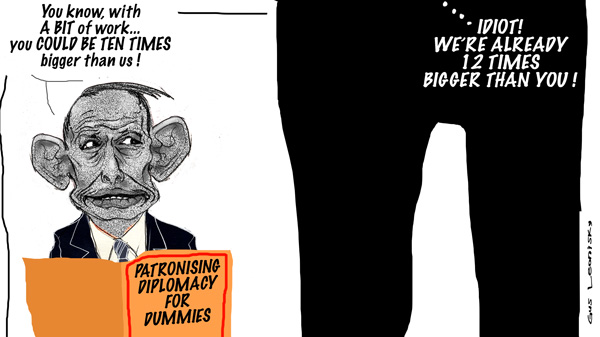Search
Recent comments
- escalationing....
1 hour 44 min ago - not happy, john....
6 hours 4 min ago - corrupt....
11 hours 25 min ago - laughing....
13 hours 19 min ago - meanwhile....
14 hours 48 min ago - a long day....
16 hours 42 min ago - pressure....
17 hours 30 min ago - peer pressure....
1 day 8 hours ago - strike back....
1 day 8 hours ago - israel paid....
1 day 9 hours ago
Democracy Links
Member's Off-site Blogs
foot in mouth disease at the abbottoirs...

- By Gus Leonisky at 2 Oct 2013 - 7:05am
- Gus Leonisky's blog
- Login or register to post comments
abbott, still in kiddies trousers...
The actions of the new Abbott Government could change that. Australia’s newly assertive approach to the multilateral problem of transnational migration is starting to have a serious impact on our bilateral relationship with Indonesia. That’s exceedingly bad news for Australia, because a good relationship with Indonesia is our most important foreign policy priority.
How do we know this? Because the Indonesians are telling us. You may not have noticed it if you read the Daily Telegraph, but Indonesia is starting to tire of the Coalition’s rhetoric on asylum seekers. Understandably, many in Indonesia’s government and parliament see it as meddling in Indonesia’s domestic affairs.
The warnings have been coming regularly for months now. In May, Indonesia's Ambassador to Australia, Nadjib Riphat Kesoema, warned the Coalition that Indonesia would not agree to the policy. “Indonesia is a target country and we are also the victim of this situation so I think it's not possible for the Coalition to say it has to go to Indonesia - back to Indonesia because Indonesia is not the origin country of these people,” Kesoema said. “We don't know the situation ahead of us right now but I think ... no such collaboration will happen ... between Indonesia and Australia.”
During the election campaign, Mahfudz Siddiq, the head of Indonesia's parliamentary Foreign Affairs Commission, warned of the implications of the Coalition’s Operation Sovereign Borders. “It's an unfriendly idea coming from a candidate who wants to be Australian leader,” Siddiq told AAP in July. “That idea shows how he sees things … Don't look at us, Indonesia, like we want this people smuggling."
“This is really a crazy idea, unfriendly, derogatory and it shows lack of understanding in this matter.”
https://newmatilda.com/2013/09/19/abbott-risks-it-all-stop-boats
women and national diversity...
When Susilo Bambang Yudhoyono (SBY), replaced Megawati as President, he appointed four women as cabinet ministers, including into two key economic portfolios – finance (Sri Mulyani) and trade (Mari Pangestu). Throughout his two terms, SBY has had at least four women in senior cabinet positions.
The current Indonesian cabinet is also highly diverse in ethnic and religious representation – with Catholics, Protestants, a Hindu and Indonesians of Chinese origin represented in this cabinet.
For all the short-comings of the Indonesian government (and needless to say, many are well-documented), every Indonesian cabinet since 1998 has been carefully constructed to democratically represent Indonesia’s national diversity.
The vhttp://www.independentaustralia.net/Wordpress/wp-admin/post.php?post=48142&action=editast Indonesian media is critically scrutinising many aspects of Australian politics, including the make-up of its government. Australia has a public relations exercise to win in Indonesia, that goes way beyond simply a relationship between two executive governments.
http://www.independentaustralia.net/2013/politics/tony-abbott-and-australias-declining-status-in-indonesia/
exclusives to the daily murdographs?....
Despite Australian Prime Minister Tony Abbott’s push to strengthen ties with Indonesia during a meeting with business and government delegates on Tuesday morning, a press conference following the breakfast was restricted to the Australian media.
Local media, including the Jakarta Globe, were not allowed to attend the press briefing that saw Abbott and Australia’s foreign minister, Julie Bishop, speak with Australian media.
Umar Idris, the chairman of the Jakarta branch of the Alliance of Independent Journalists (AJI), said it was the first time he had heard of a case where local journalists had been excluded from a conference, and condemned the move.
“Australia has good press freedom and so they should practice that in Indonesia as well,” Umar told the Globe. “Tony Abbott’s visit is important for the Indonesian media, and journalists should be granted open, equal access.”
The move comes as the Australian government has enforced a media blackout where it will now only hold one press conference a week for Australian media on asylum-seeker issues.
http://www.independentaustralia.net/2013/politics/tony-abbott-shuts-out-local-reporters-from-indonesian-press-conferences/
two years imprisonment for tony abbott...
Tony Abbott has incurred the wrath of Indonesia's journalists by excluding them from a press conference, and even committed a criminal offence, according to the head of the country's journalists' union.
Local journalists were incensed that, on the Australian Prime Minister's first official visit, he locked them out of his Tuesday morning press conference.
Indonesian language newspaper Rakyat Merdeka spent a large part of page 10 of its Wednesday edition focused on the snub, saying it was discriminatory.
“What's the use for him coming all the way to Indonesia if he only gives a press conference to Australian journalists?” the paper asked.
It reported the Australian embassy's press spokesman Ray Marcelo saying: “Sorry, this is the Prime Minister's Office request”.
Australian journalists were also told the press conference was only for them, and it meant Indonesian media were unable to put any questions to the visiting Prime Minister.
But Umar Idris, the head of the Jakarta chapter of the Alliance for Independent Journalists, said the actions of Mr Abbott — himself a former journalist — were not just discourteous, but criminal.
“The press law in Indonesia says it is a crime to limit journalists to get access to information. The penalty for that is two years' imprisonment,” Mr Umar said.
“We cannot accept whatever reason Australia gave for limiting access to information for Indonesian journalists.”
Mr Abbott's office did not respond to requests for an explanation.
Read more: http://www.smh.com.au/federal-politics/political-news/abbott-broke-law-with-media-shutout-say--indonesian-journalists-20131002-2usnn.html#ixzz2gYfRFqnd
The Indonesian journalists have to make allowances... Tony Abbott is an idiot.